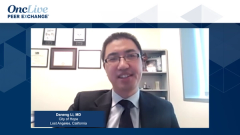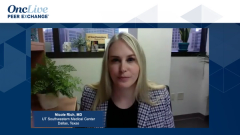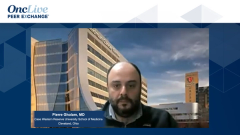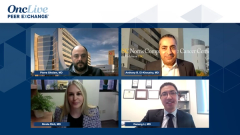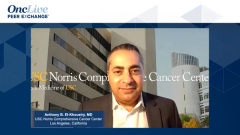
First-Line Systemic Treatment for Advanced HCC
Anthony B. El-Khoueiry, MD, provides insight on the evolution of care for frontline systemic therapy in advanced HCC and discusses currently approved first-line standard of care options.
Episodes in this series

Anthony B. El-Khoueiry, MD: Hello, and welcome to this OncLive® Peer Exchange® titled “A New Wave of Progress in the Treatment of Hepatocellular Carcinoma.” I’m Anthony El-Khoueiry. I’m a GI [gastrointestinal] medical oncologist at the USC [University of Southern California] Norris Comprehensive Cancer Center in Los Angeles, California. I’m joined by 3 friends and colleagues who are experts in the field of treatment of hepatocellular carcinoma [HCC], and I ask them to introduce themselves. I’d like to start with Dr Nicole Rich.
Nicole Rich, MD: Hi. My name is Nicole Rich. I’m a transplant hepatologist at UT [University of Texas] Southwestern Medical Center in Dallas, Texas.
Anthony B. El-Khoueiry, MD: Next is Dr Pierre Gholam.
Pierre Gholam, MD: My name is Pierre Gholam. I’m a professor of medicine at Case Western Reserve University School of Medicine, and I lead our multidisciplinary hepatobiliary tumor team at the NCI [National Cancer Institute]–designated Seidman Cancer Center in Cleveland, Ohio.
Anthony B. El-Khoueiry, MD: Last but not least is Dr Daneng Li.
Daneng Li, MD: Hi, everyone. I’m Daneng Li. I’m a GI medical oncologist, and I lead our hepatobiliary tumor program at City of Hope in Duarte, California.
Anthony B. El-Khoueiry, MD: Welcome, everyone. We’re going to discuss a number of recent updates regarding the treatment of hepatocellular carcinoma, including some exciting abstracts and presentations from the 2022 ASCO GI [American Society of Clinical Oncology Gastrointestinal Cancers Symposium]. We’ll discuss the data in the context of other recent updates to the treatment landscape and their impact on clinical practice.
Let’s get started with our first topic, which is a review of the approved first-line systemic options for patients with advanced HCC. I’ll start by covering the data as of January 2022, and then ask some of my colleagues to update on other newer developments. I’ll start chronologically. For a long time, sorafenib was the only standard of care for advanced HCC. This was based on the SHARP trial as well as another international study known as the Asia-Pacific trial, both of which compared sorafenib with placebo. In the SHARP trial, sorafenib was superior to placebo with a median overall survival [OS] of between 10 and 11 months.
Then we had a long gap of close to 10 years of negative studies in which different compounds were either compared with sorafenib or added to sorafenib. They all failed until the REFLECT study was conducted, which was a noninferiority study comparing lenvatinib with sorafenib in patients with advanced HCC. These are patients with Child-Pugh A cirrhosis and good performance status. They had to be candidates for systemic therapy. Patients were randomized 1:1 to lenvatinib or sorafenib, and the study met its noninferiority end point. The median overall survival with lenvatinib was about 13 months, and with sorafenib, it was about 12 months. The confidence interval was below the threshold of 1.08, which was required to meet the noninferiority end point. Despite the median OS being quite similar, lenvatinib had a higher PFS [progression-free survival] and superior response rate compared with sorafenib. That may have influenced how it was used compared with sorafenib in the clinic.
After that came the data with single-agent anti–PD-1 therapy with nivolumab and pembrolizumab, with phase 1/2 studies showing promising response rates and durable responses. Those data led to the phase 3 study known as CheckMate 459. That study compared nivolumab with sorafenib in previously untreated patients with first-line advanced HCC. It was a superiority study. In that study, nivolumab led to a median overall survival of around 16 months, and sorafenib around 14 months, but the study didn’t meet the superiority end point. It wasn’t statistically significant. The response rate was confirmed. It was the same as what’s seen in the phase 1/2 data, with a response rate of around 16% or 17% for nivolumab. The responses were durable. The safety was confirmed as well. As a matter of fact, the quality-of-life data favored nivolumab for the duration of therapy in that trial. But it was a negative study, statistically speaking.
The next step was to add on to anti–PD-1 therapy. That brings us to the IMbrave150 study, in which atezolizumab, an anti-PD-L1 antibody, was combined with bevacizumab, the anti-VEGF antibody. Atezolizumab-bevacizumab was compared with sorafenib. This was a 2:1 randomization with Child-Pugh A patients, mostly BCLC [Barcelona Clinic Liver Cancer] stage C. The study was a positive trial at all levels. There was a superior overall survival, a superior PFS, and a superior response with the combination of atezolizumab and bevacizumab. The median overall survival was an unprecedented 19 months for the combination of atezolizumab-bevacizumab vs about 13 months with sorafenib. The PFS was about 6.9 months, and the response rate was about 30% with atezolizumab-bevacizumab.
Of note, because of the risk of bleeding with bevacizumab, this study required that patients undergo an endoscopy within 6 months prior to enrollment to ensure that if there were varices, the requirement was that they’d be treated based on institutional standard. It required variceal screening and therapy based on institutional standard. Those are the data as of January 2022. I focus mostly on efficacy, but based on this, atezolizumab-bevacizumab became the first-line standard for patients who have no contraindications to immunotherapy or bevacizumab. Otherwise, the options were to use TKIs [tyrosine kinase inhibitors], like sorafenib or lenvatinib.
Transcript Edited for Clarity


